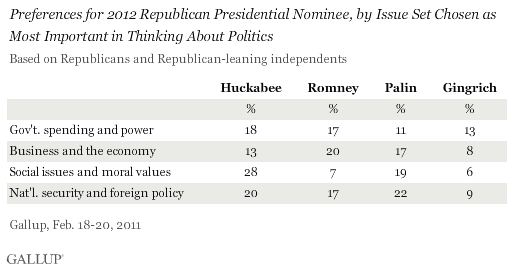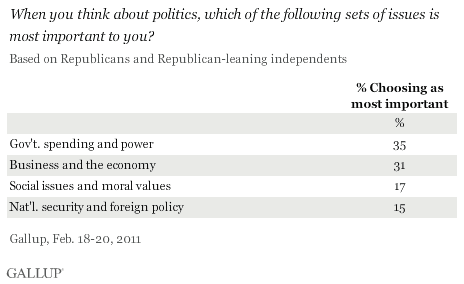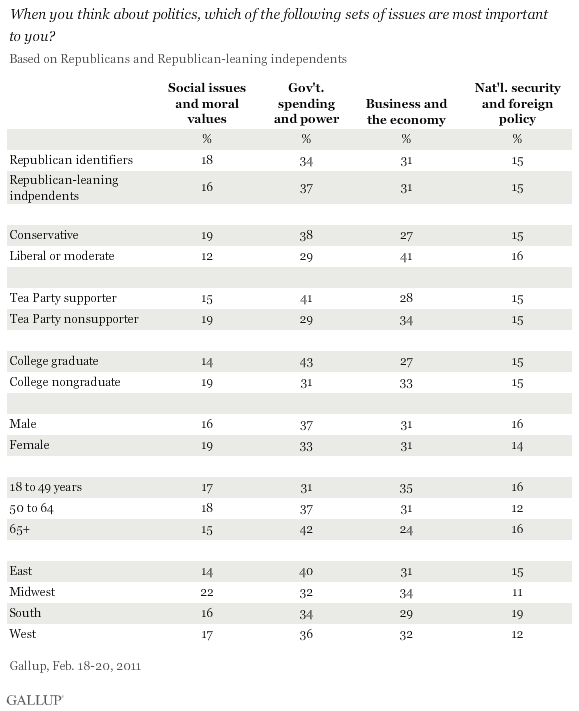PRINCETON, NJ -- Although Mike Huckabee, Mitt Romney, and Sarah Palin lead the field of potential Republican presidential candidates among all Republicans nationwide, there are significant differences in candidate preferences when Republicans are divided by the issue they think is most important. Those focused on government spending and power are most likely to favor Huckabee or Romney, while those focused on the economy favor Romney or Palin. Republicans who say social and moral values are most important favor Huckabee or Palin.

Most individuals view politics through many different lenses, usually relating to their party of choice. But in a nomination contest, when party labels are the same among candidates, voters need to look at other factors to decide whom they will support. Gallup isolated four issues Americans might take into account when thinking about politics in a poll conducted Feb. 18-20 and found a good deal of dispersion in Republicans' relative priorities across these issues -- as well as in the relationships to candidate choice.
Former Arkansas Gov. Huckabee wins among the social and moral values issues segment, as might be expected given his background as a Southern Baptist minister. He essentially ties Romney among the group most interested in government spending and power and ties Palin among the national security and foreign policy group, but does less well among those interested in business and the economy. This suggests Huckabee's possible weakness as a potential presidential candidate is views of his ability to deal with economic issues.
Former Massachusetts Gov. Romney wins among those focused on business and the economy, as befits his former experience as a businessman with a Master of Business Administration degree from Harvard. He ties Huckabee among those interested in government spending and power, but does less well among those focused on national security and particularly so among those focused on social issues. The latter positioning could reflect his switching positions on values issues such as abortion prior to his 2008 run for president.
Former Alaska Gov. and vice presidential candidate Palin does slightly better among those focused on national security and foreign policy than on values issues and business and the economy. She performs much less well among those focused on government spending and power, despite being one of the leading public supporters of the Tea Party movement.
Former Speaker of the House Newt Gingrich does better among Republicans focused on government spending and power, but this is the only set of issues on which his support among Republican segments is in double digits.
Republicans Most Focused on Government and the Economy
The basic segmentation question used in this analysis asked Republicans and Republican-leaning independents to choose which of four issues is most important to their political thinking. Government spending and power as well as business and the economy dominate the issues of importance in Republicans' minds. National security and foreign policy -- the primary concerns of Republicans at times in the past -- rank last as Republicans' issue concerns at this point, even though interviewing was conducted amid the chaos and massive changes taking place in Egypt, Libya, and other Middle Eastern countries. A relatively small number of Republicans select social and moral issues as most important -- even though these two have been a key component of Republican political efforts in the past.

Republicans' Issues of Choice Are Related to Ideology, Tea Party Supporter Status
Republicans' choice of issues relates to their underlying ideology. Conservative Republicans, who make up the majority of Republicans nationwide, are more focused on big government and spending than are liberal/moderate Republicans. The latter are somewhat more focused on business and the economy. Tea Party supporters, 53% of Republicans in this survey, are most focused on government spending and power, followed by business and the economy.
Other differences by demographic category appear in the accompanying table. Those disproportionally interested in government power and spending are college graduates, older Americans, and those living in the East. There is relatively little differentiation across demographic categories in interest in social issues and moral values, with the exception of somewhat higher interest among those living in the Midwest. Of all the age groups, older Americans are least interested in business and the economy, perhaps because they have less immediate concerns about the job market. There are no major differences across these categories in interest in national security and foreign policy.

Implications
There are many ways to segment the Republican voting population as next year's presidential primaries and caucuses draw closer. One of these is "issues voting groups" -- divisions based on the issues voters consider most important in their political thinking. Given four issue choices, Republicans at this point are most focused on two: the role of government and the economy. Fewer Republicans choose national security and moral issues at this point in the 2012 election cycle, even though international and moral issues have often defined the GOP's political platforms in previous years.
These issue segments do not totally determine candidate preferences at this point, but some strengths and weaknesses of the leading candidates among Republicans in each of these groups do emerge. Huckabee has his greatest strength among those focused on social and moral issues, and is weaker among business- and economy-focused voters. Romney does relatively well among each issue group except those most focused on moral issues. Palin is strongest among foreign policy-focused voters and is weaker among those interested in government power and spending. Gingrich is modestly stronger among Republicans interested in government power.
A successful candidate for the GOP nomination will not necessarily need to do well across all of these voter segments, but certainly will need to be aware of his or her positioning among those in each segment. Single-issue candidates can win primaries, but generally a broader appeal across issue groups can help a candidate win the multiple primaries necessary to gain a party's nomination.
Survey Methods
Results for this Gallup poll are based on telephone interviews conducted Feb. 18-20, 2011, on the Gallup Daily tracking survey, with a random sample of 1,326 Republicans and Republican-leaning independents, aged 18 and older, living in all 50 U.S. states and the District of Columbia, selected using random-digit-dial sampling.
For results based on the total sample of Republicans, one can say with 95% confidence that the maximum margin of sampling error is ±3 percentage points.
Interviews are conducted with respondents on landline telephones and cellular phones, with interviews conducted in Spanish for respondents who are primarily Spanish-speaking. Each daily sample includes a minimum quota of 200 cell phone respondents and 800 landline respondents, with additional minimum quotas among landline respondents for gender within region. Landline respondents are chosen at random within each household on the basis of which member had the most recent birthday.
Samples are weighted by gender, age, race, Hispanic ethnicity, education, region, adults in the household, cell phone-only status, cell phone-mostly status, and phone lines. Demographic weighting targets are based on the March 2010 Current Population Survey figures for the aged 18 and older non-institutionalized population living in U.S. telephone households. All reported margins of sampling error include the computed design effects for weighting and sample design.
In addition to sampling error, question wording and practical difficulties in conducting surveys can introduce error or bias into the findings of public opinion polls.
View methodology, full question results, and trend data.
For more details on Gallup's polling methodology, visit www.gallup.com.
